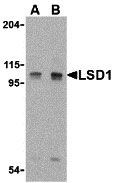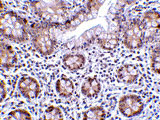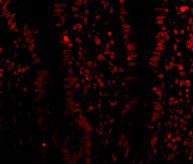LSD1 Antibody
- 产品详情
- 实验流程
- 背景知识
Application
| WB, IF, E, IHC-P |
|---|---|
| Primary Accession | O60341 |
| Other Accession | NP_001009999, 58761544 |
| Reactivity | Human, Mouse, Rat |
| Host | Rabbit |
| Clonality | Polyclonal |
| Isotype | IgG |
| Calculated MW | 92903 Da |
| Concentration (mg/ml) | 1 mg/mL |
| Conjugate | Unconjugated |
| Application Notes | LSD1 antibody can be used for the detection of LSD1 by Western blot at 1 - 2 µg/mL. Antibody can also be used for immunohistochemistry starting at 2 µg/mL. For immunofluorescence start at 20 µg/mL. |
| Gene ID | 23028 |
|---|---|
| Other Names | LSD1 Antibody: AOF2, KDM1, LSD1, BHC110, AOF2, KIAA0601, Lysine-specific histone demethylase 1A, BRAF35-HDAC complex protein BHC110, lysine (K)-specific demethylase 1 |
| Target/Specificity | KDM1; |
| Reconstitution & Storage | LSD1 antibody can be stored at 4℃ for three months and -20℃, stable for up to one year. As with all antibodies care should be taken to avoid repeated freeze thaw cycles. Antibodies should not be exposed to prolonged high temperatures. |
| Precautions | LSD1 Antibody is for research use only and not for use in diagnostic or therapeutic procedures. |
| Name | KDM1A (HGNC:29079) |
|---|---|
| Function | Histone demethylase that can demethylate both 'Lys-4' (H3K4me) and 'Lys-9' (H3K9me) of histone H3, thereby acting as a coactivator or a corepressor, depending on the context (PubMed:15620353, PubMed:15811342, PubMed:16079794, PubMed:16079795, PubMed:16140033, PubMed:16223729, PubMed:27292636). Acts by oxidizing the substrate by FAD to generate the corresponding imine that is subsequently hydrolyzed (PubMed:15620353, PubMed:15811342, PubMed:16079794, PubMed:21300290, PubMed:26214369). Acts as a corepressor by mediating demethylation of H3K4me, a specific tag for epigenetic transcriptional activation. Demethylates both mono- (H3K4me1) and di-methylated (H3K4me2) (PubMed:15620353, PubMed:20389281, PubMed:21300290, PubMed:23721412). May play a role in the repression of neuronal genes. Alone, it is unable to demethylate H3K4me on nucleosomes and requires the presence of RCOR1/CoREST to achieve such activity (PubMed:16079794, PubMed:16140033, PubMed:16885027, PubMed:21300290, PubMed:23721412). Also acts as a coactivator of androgen receptor (AR)-dependent transcription, by being recruited to AR target genes and mediating demethylation of H3K9me, a specific tag for epigenetic transcriptional repression. The presence of PRKCB in AR-containing complexes, which mediates phosphorylation of 'Thr-6' of histone H3 (H3T6ph), a specific tag that prevents demethylation H3K4me, prevents H3K4me demethylase activity of KDM1A (PubMed:16079795). Demethylates di-methylated 'Lys-370' of p53/TP53 which prevents interaction of p53/TP53 with TP53BP1 and represses p53/TP53-mediated transcriptional activation. Demethylates and stabilizes the DNA methylase DNMT1 (PubMed:29691401). Demethylates methylated 'Lys-42' and methylated 'Lys-117' of SOX2 (PubMed:29358331). Required for gastrulation during embryogenesis. Component of a RCOR/GFI/KDM1A/HDAC complex that suppresses, via histone deacetylase (HDAC) recruitment, a number of genes implicated in multilineage blood cell development (PubMed:16079794, PubMed:16140033). Facilitates epithelial-to-mesenchymal transition by acting as an effector of SNAI1- mediated transcription repression of epithelial markers E- cadherin/CDH1, CDN7 and KRT8 (PubMed:20562920, PubMed:27292636). Required for the maintenance of the silenced state of the SNAI1 target genes E-cadherin/CDH1 and CDN7 (PubMed:20389281). Required for the repression of GIPR expression (PubMed:34655521, PubMed:34906447). |
| Cellular Location | Nucleus. Chromosome. Note=Associates with chromatin |
| Tissue Location | Ubiquitously expressed. [Isoform 4]: Expressed exclusively in brain tissues. |
For Research Use Only. Not For Use In Diagnostic Procedures.
Provided below are standard protocols that you may find useful for product applications.
BACKGROUND
LSD1 Antibody: Histone modifications mediate changes in gene expression by altering chromatin structure or by serving as a platform to recruit other proteins. LSD1 is a recently discovered amine oxidase that catalyzes the lysine-specific demethylation of histone proteins via an FAD-dependent oxidative reaction. Methylation on histone H3-K9 is thought to play an important role in heterochromatin formation, while methylation on arginine and some lysine residues (such as H3-K4) is associated with active transcription. LSD1 associates with various proteins, including HDAC1/2, CoREST, and BHC80, that act to regulate LSD1 activity in vivo, and in a histone H3-K4-specific methylase complex that is involved in transcriptional regulation. Experiments have shown that CoREST, a SANT domain-containing corepressor acts to enhance LSD1 activity, while BHC80, a PHD domain-containing protein, inhibits CoREST/LSD1 activity in vitro. LSD1-mediated histone demethylation thus may have significant effects on gene expression.
REFERENCES
Shi Y, Lan F, Matson C, et al. Histone demethylation mediated by the nuclear amine oxidase homolog LSD1. Cell 2004; 119:941-53.
Kouzarides T. Histone methylation in transcriptional control. Curr. Opin. Genet. Dev. 2002; 12:198-209.
Shi YJ, Matson C, Lan F, et al. Regulation of LSD1 histone demethylase activity by its associated factors. Mol. Cell 2005; 19:857-64.
Nakamura T, Mori T, Tada S, et al. ALL-1 is a histone methyltransferase that assembles a supercomplex of proteins involved in transcriptional regulation. Mol. Cell 2002; 10:1119-28.
终于等到您。ABCEPTA(百远生物)抗体产品。
点击下方“我要评价 ”按钮提交您的反馈信息,您的反馈和评价是我们最宝贵的财富之一,
我们将在1-3个工作日内处理您的反馈信息。
如有疑问,联系:0512-88856768 tech-china@abcepta.com.























 癌症的基本特征包括细胞增殖、血管生成、迁移、凋亡逃避机制和细胞永生等。找到癌症发生过程中这些通路的关键标记物和对应的抗体用于检测至关重要。
癌症的基本特征包括细胞增殖、血管生成、迁移、凋亡逃避机制和细胞永生等。找到癌症发生过程中这些通路的关键标记物和对应的抗体用于检测至关重要。 为您推荐一个泛素化位点预测神器——泛素化分析工具,可以为您的蛋白的泛素化位点作出预测和评分。
为您推荐一个泛素化位点预测神器——泛素化分析工具,可以为您的蛋白的泛素化位点作出预测和评分。 细胞自噬受体图形绘图工具为你的蛋白的细胞受体结合位点作出预测和评分,识别结合到自噬通路中的蛋白是非常重要的,便于让我们理解自噬在正常生理、病理过程中的作用,如发育、细胞分化、神经退化性疾病、压力条件下、感染和癌症。
细胞自噬受体图形绘图工具为你的蛋白的细胞受体结合位点作出预测和评分,识别结合到自噬通路中的蛋白是非常重要的,便于让我们理解自噬在正常生理、病理过程中的作用,如发育、细胞分化、神经退化性疾病、压力条件下、感染和癌症。








